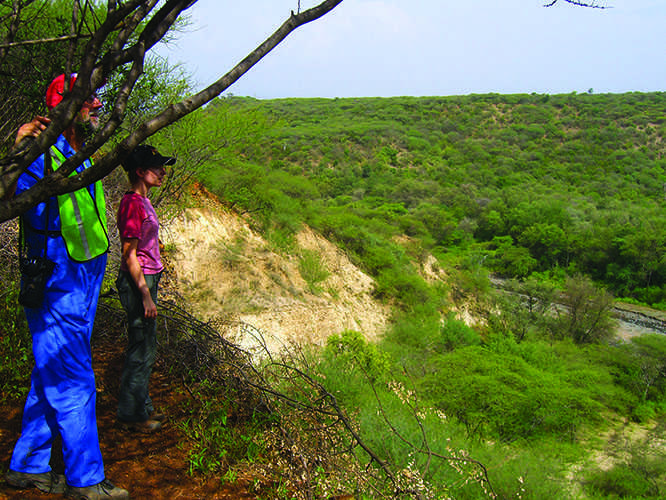Alumna research leads to Africa
Photo by Picasa
October 16, 2013
A UW-Eau Claire education can take you far, maybe even as far as Africa.
Eau Claire alumna Sarah Ivory took another trip to Africa to research how vegetation affects human evolution. She said going to Africa was the next step after finishing up her PhD from University of Arizona.
“I worked on Africa vegetation for the last five years during my dissertation, and I haven’t had any opportunity to go into the field and look at the vegetation first hand,” Ivory said. “My adviser had this project going, and I always thought that it would be a great opportunity to be able to go to Africa.”
Ivory said the team worked by taking long drill cores from two sites in Kenya, each core being a little over two hundred meters — approximately 656 feet. She said the samples would be cut up and sectioned off to be shipped to the United States and looked at closer in the months to come.
“I look at fossil pollen,” Ivory said. “By looking at that pollen I can kind of reconstruct what the vegetation might have looked like in the past.”
Eau Claire anthropology professor Bob Barth said vegetation relates directly to how humans evolve.
“Vegetation is part of different eco niches, and organisms evolve into eco niches,” Barth said. “Also, changes in vegetation was one of the things that lead homo sapians to go out of Africa, so vegetation is very important because it’s part of the overall environment in which you adapt.”
Studying cores in Kenya taught Ivory so much more than what her research set out to do. She said she got to know the locals, their culture and how to stay safe in Kenya.
“You are more on your guard,” Ivory said. “I was with a group of people who knew Kenya really well and the area well and could give me some advice on where to go, where not to go, and what to do to make sure that you had personal safety.”
Ivory said many times, safety wasn’t just a social construct, but an environmental one as well such as not placing a backpack on the ground because a snake might crawl in it.
The locals may have taught Ivory a lot, but her education at Eau Claire was something that also impacted her life, she said.
“It helped me a lot actually,” Ivory said. “I was really lucky because I was always involved in research projects.”
A professor at Eau Claire that changed her course of study and direction of her career was Biology professor Joe Rohrer. Rohrer said Ivory was a great student who was smart and
motivated.
“I remember her saying that being in my class reminded her of how much she liked plants,” Rohrer said. “It was some time the next year that she majored in biology, and since she had been in my class, she started to talk to me and I got her involved in a research project that had to do with Native American plumbs.”
Ivory said her work is not done researching the cores and samples that the team has taken. She said in the months to come she hopes to learn more about how the vegetation in parts of Africa influenced how early humans evolved.

